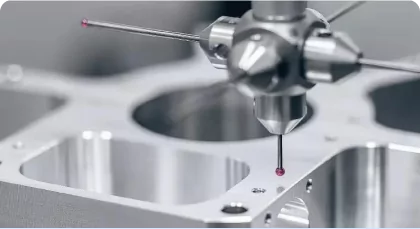High-Temperature Plastics Machining
High-Temperature Plastics Machining: Precision Solutions for Demanding Applications
High-temperature plastics are engineered to withstand extreme thermal conditions while maintaining structural integrity, making them indispensable in aerospace, automotive, electronics, and industrial applications. However, machining these advanced polymers requires specialized expertise to prevent deformation, stress cracking, and surface degradation. This article explores the key considerations, techniques, and solutions for high-temperature plastics machining.
Challenges in Machining High-Temperature Plastics
Unlike conventional plastics, high-performance thermoplastics (such as PEEK, PEI, PPS, and PI) present unique machining difficulties:
Thermal Sensitivity – Excessive heat can cause warping or melting during cutting.
Abrasive Nature – Reinforced plastics (e.g., glass- or carbon-filled) accelerate tool wear.
Dimensional Stability – Maintaining tight tolerances is critical for precision parts.
Surface Finish Requirements – Many applications demand smooth, burr-free edges.
Specialized Machining Techniques
To overcome these challenges, manufacturers use advanced machining strategies:
1. CNC Machining with Optimized Tooling
Carbide or Diamond-Coated Tools – Resist abrasion and reduce heat buildup.
High-Speed, Low-Feed Rates – Prevent material overheating.
Coolant Selection – Non-abrasive coolants (e.g., air blast or minimal lubrication) avoid resin degradation.
2. Laser Cutting & Precision Waterjet
CO₂ or Fiber Lasers – Clean cuts with minimal thermal distortion.
Waterjet Cutting – Ideal for thick or reinforced plastics without heat-affected zones.
3. Cryogenic Machining (For Ultra-High-Temp Plastics)
Liquid nitrogen cooling prevents thermal expansion during cutting.
Key High-Temperature Plastics & Their Applications
| Material | Max Temp. Resistance | Common Uses |
|---|---|---|
| PEEK | 250°C (482°F) | Aerospace seals, medical implants, semiconductor parts |
| PEI (Ultem) | 170°C (338°F) | Electrical insulators, aircraft interiors |
| PPS | 220°C (428°F) | Pump components, chemical processing parts |
| PI (Polyimide) | 300°C+ (572°F+) | Jet engine components, high-temp bearings |
Critical Industries & Applications
Aerospace – Engine bushings, thermal shields, and electrical connectors.
Medical – Autoclavable surgical tools and implantable devices.
Automotive – Under-the-hood sensors and transmission components.
Electronics – Insulating components for PCBs and LED housings.
Oil & Gas – Seals and valves for high-pressure, high-heat environments.
Choosing a Machining Partner: Key Considerations
When selecting a manufacturer for high-temperature plastic components, verify their capabilities in:
✔ Material-Specific Expertise – Experience with PEEK, PEI, and other advanced polymers.
✔ Precision Tooling – Dedicated toolpaths to minimize heat and stress.
✔ Quality Assurance – CMM inspection and thermal testing for dimensional stability.
✔ Prototyping to Production – Scalability from low-volume R&D to full production.
Why Precision Machining Matters
Poorly machined high-temp plastics can lead to:
Premature part failure due to microcracks or residual stresses.
Reduced performance in critical thermal or mechanical applications.
Increased costs from scrap and rework.
A skilled manufacturer ensures:
✅ Accurate tolerances (as tight as ±0.025mm).
✅ Superior surface finishes (Ra < 0.8µm achievable).
✅ Consistency across production runs.
High-temperature plastics enable innovation in extreme environments, but their full potential is only realized through precision machining. Partnering with an experienced manufacturer ensures components meet stringent thermal, mechanical, and dimensional requirements.
Need reliable high-temperature plastic machining? Alpha-Mold combines advanced technology with material science expertise to deliver flawless results.
Website: https://www.alpha-mold.com/
Email: info@alpha-mold.com
Trust a supplier that understands the nuances of high-performance polymers—delivering parts that perform under pressure.








